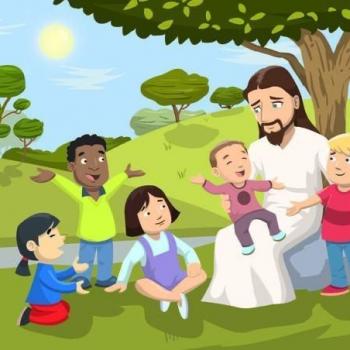
This past weekend, I found myself home alone without my wife or kids, so I decided to go across Lake Pontchartrain to spend a couple nights at St. Joseph Abbey, a Benedictine monastery in Covington. It was a wonderful experience. Four times each day, we sat in the chancel of their beautiful church to chant psalms and listen to God’s word together. Every meal was eaten in silence. It was a church without chatter. And it was incredibly liberating.
Father Augustine was my host. Though we barely spoke more than a paragraph of words between us, the tenderness that he showed me was especially poignant. When you take the chatter out of your interactions, the little gestures gain a greater accent. Father Augustine was very deliberate about making sure that I was able to follow what was going on when we performed the offices of vigil, lauds, vespers, and compline. If he saw that I seemed lost, he would break his vow of silence to get me to where I needed to be. At each meal, he unfolded my napkin for me and poured water into my glass to start the meal. He brought my dessert to the table for me. He took my plate when I was done eating.
Each of Father Augustine’s gestures were filled with love in a way that isn’t as palpable when the air is filled with chatter. Perhaps it was simply that the silence gave me the space to contemplate the humanity of the people around me. Some of the monks are very old. My heart was touched by the way that they would show up for prayers half an hour early so that they could make the slow climb up up dozens of steps with their walkers to be in place on time. But even the ones with walkers insisted that I get my food before them.
A church without chatter allows people to remain a mystery. This was the case for me with the abbott, or head of the monks. I often study people’s faces, thinking that I can tell something about them. At first, the abbott seemed to have a severe scowl on his face. After compline the first evening, we walked past the fountain in the back of the sanctuary with our heads bowed while he vigorously splashed each of us with holy water. It felt like he was trying to whip Satan out of me using drops of water. So I was afraid of him at first.
But then when he opened his mouth the next day to read a psalm, his voice was incredibly soft and gentle. After hearing him speak, his facial expression looked different to me. I saw a man who was carrying a heavy burden, a man who wasn’t entirely sure of himself. Obviously these are all presumptuous speculations in my head. Maybe he had a migraine headache the entire weekend. Maybe he was just having to squint because he has cataracts. Maybe that’s just what his face looks like and I need to stop presuming to read anything in other people’s facial expressions. But there was something beautiful about the way that God softened my heart toward him in the absence of knowing him. I was somehow able to love him as a complete stranger and ask God to help him with his burden.
At each of our silent meals, the chatter was replaced by a stimulating reading that was shared by one of the monks. At our Saturday lunch, we heard a reading about Thomas Merton’s interactions with Zen that seemed a bit radical for a Benedictine monastery. I kept looking around to see if anyone was grimacing, but they weren’t. I was loving every minute of it. I share Merton’s conviction that people from other faiths have insights that are worth contemplating. I believe that the Christian paradigm is uniquely salvific, but I don’t think that requires me to say that every other religion is utterly false.
At dinner, we heard a very beautifully poetic essay about the way that all of creation is permeated with song. It was called “The Song We Live” or something like that. It went all over the place in its allusions and gestures. At times, I thought the writer was a postmodern theorist. But then it became very clear through the references to official church documents that it was written within the Roman Catholic tradition. It feels crudely shallow to say it this way, but the reading showed a beautiful side of conservatism. There was a reference in one paragraph to the interplay of “female” and “male” within rhythmical and melodic structures. While I of course believe that gender is more nuanced and beautiful than the traditionalist binary, it was helpful to be reminded that Roman Catholic tradition occurs within a rich and complex poetics. It isn’t just the crude ideology that comes out in church chatter.
I’m not sure what to conclude about my weekend in a church without chatter. It’s given me a lot to process as I think about how to cultivate an authentic worship space for campus ministry. I am increasingly convicted that one of the most desperate needs within our culture, especially among the students with whom I work, is a chatter-free space. To me, that’s what Sabbath means, creating time and space where the trivialities of everyday life can be set aside so that we experience the eternal. How does that translate into worship? I’m not sure. I don’t think it necessarily requires a particular genre of music or order of liturgy.
Right now I’m feeling called toward framing our weekly worship service as a sacred community meal, the way that the original Christians did. It needs to be both a hospitable space and a sacred space. So there needs to be a balance. As an introvert, I feel more welcome in spaces where conversation is more structured and intentional. In fact, I come across as an extrovert in a classroom setting. But put me at a cocktail party filled with chatter and I want to hide behind the sofa. I recognize that what I call “chatter” is probably meaningful and nourishing to extroverts in a way that it isn’t for me. However the details fall into place, my hope is that we can become a space filled with the tenderness and divine mystery that I found this past weekend at St. Joseph Abbey.












